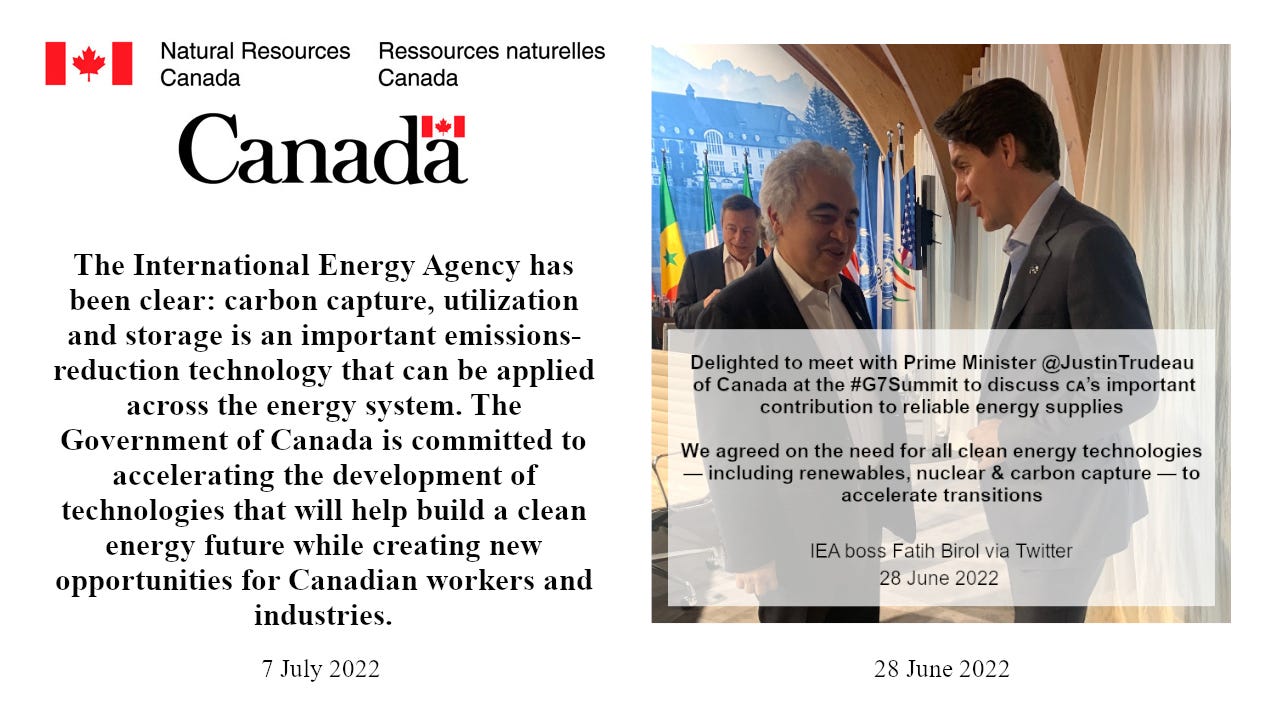We need to talk about Tzeporah Berman, the long term high profile environmental activist once dubbed ‘Canada’s Queen of Green’. By ‘we’, I mean everyone who cares about stopping the destruction from fossil fuel extraction and use. Everyone who cares about the dominance that the oil, gas and coal industries have over our societies. I want everyone to know that Canada is a carbon capture utilisation and storage (CCS) proving ground that exports its expertise.
I’m writing this piece especially for the signatories to the ‘The Leap Manifesto’ of which Tzeporah was one of many. My message is that all the pundits, climate campaigners and spokespeople need to switch from adhering to their prescribed narratives and talking points, and look closely at the political will. If industry keeps saying they are going to do carbon capture and store the CO2 deep under ground, then we should ask questions about why they feel so confident that they can achieve the seemingly impossible.
2016 – How it started
We need to talk about Tzeporah because in 2016 she sat down with Nigel Topping from We Mean Business and the Suncor CEO, Steve Williams to talk about emissions caps. At the very same time Tzeporah and others were making a big deal about meeting with the enemy, Ian MacGregor was building the North West Refining (NWR), Sturgeon tar sands CCS refining plant and the world’s largest CO2 pipeline, the Alberta Carbon Trunk Line (ACTL) which delivers CO2 from north west of Edmonton where the NWR plant is located, to southern Alberta for CO2 enhanced oil recovery.
If you watch the video of the July 2016 discussion hosted by The Climate Group, and you listen closely to the discussion about new technologies while mindful that there are no plans to scale down oil sands production, you can smell the elephant in the room, the coming CCS boom. We are told during the discussion that the negotiation of a shared position on emissions caps was complex and arduous. Surely the spectre of CCS deployment was covered in those negotiations?
Two weeks after The Climate Group discussion Ian MacGregor addressed the International Brotherhood of Boilermakers 33rd Consolidated Convention in Las Vegas. He told the audience that construction was underway and put a price on each of the three ‘trains’ that make up the complete plant at “8 billion” equaling “25 billion by the time we’re done”. We know that at the time of the discussion construction of the NWR refinery and the ACTL was underway. Ian MacGregor’s vertically integrated operations and the significant excess pipeline capacity that he projected would be taken up by industry “in the fullness of time” would almost certainly have been part of the private deliberations preceding The Climate Group hosted discussion.
A key signifier of the political will for CCS had already made an appearance 2 months before the July 2016 discussion. In May 2016, Canada’s environment minister Catherine McKenna who in 2017 would head up the Powering Past Coal Alliance toured the Boundary Dam facility and declared CCS as deployed there to be “an innovative made-in-Canada solution”. From its beginning Powering Past Coal Alliance members committed to phasing out "traditional coal" which is coal burned without carbon abatement or CCS applied.
2024 – How it’s going
If we skip forward to the present we find that Tzeporah has never made mention of the Alberta Carbon Trunk Line despite the fact that it became operational in June 2020 and celebrated its ‘megatonne milestone’ in March 2021. In November 2021 the Pathways Alliance announced their ‘vision’ of a CO2 pipeline and storage project that would emulate the Alberta Carbon Trunk Line. The project would combine the efforts of the six largest oil sands producers in Canada: Canadian Natural, Cenovus, Conocco Phillips, Imperial, MEG Energy and Suncor. On 23 March 2024 the Pathways Alliance announced that it had filed an application for a 400 kilometre CO2 pipeline from northern Alberta to a storage hub near Cold Lake.
The missing years
The years between 2016 and the present can be characterised by a relentlessly expanding political will and Tzeporah’s apparent blindness to the concession positions operationalised under the global climate consensus. Tzeporah Berman shares the blindness of all the well established climate campaigners.
Here are some notable highlights:
2016 – Wolf Midstream acquires a 50% stake in the Access Pipeline. This pipeline is the supply line providing the tar sands inputs for the NWR facility.
Access is an attractive foundational asset for Wolf that provides us with immediate scale as a midstream entity. This asset has significant expansion potential and is well positioned to interconnect with future midstream initiatives in the Fort Saskatchewan area.
2017 – Extinction Rebellion co-founder Farhana Yamin launched Track 0 in 2014. In 2017 Climate Action Network International published a document prepared by Track 0 called: A COMPENDIUM OF SOLUTIONS FOR ACHIEVING THE SUSTAINABLE DEVELOPMENT GOALS AND STAYING BELOW 2°C OR 1.5ºC. That document contains a crucial acknowledgement that the success of the most promising means of producing negative emissions, biomass with CCS (BECCS), is contingent on the success of the companies that make up the Oil and Gas Climate Initiative. It also contains a foreword by Christiana Figueres, former UNFCCC Executive Secretary 2010-2016. The position, which real environmentalists should decry is this: for BECCS to deliver negative emissions it needs to be supported by CO2 transport and storage infrastructure, and in Europe that infrastructure is being developed by the Oil and Gas Climate Initiative (OGCI).
Bioenergy production can be integrated with existing CCS technologies relatively simply and there are no technical implications of capturing a CO2 stream from biomass (Gough and Upham, 2010; Muratori et al., 2016). BECCS could complement the current expansion of the use of biomass as fuel (Rhodes and Keith, 2008). However, the success of BECCS is dependent on upcoming developments in CCS, where there are significant uncertainties surrounding CO2 transport networks, storage capacities, legality, social acceptability and technology incentives (McGlashen, Shah and Workman, 2010).
2018 – At around the same time as the IPCC were releasing reports from working groups 1, 2 and 3, Greta Thunberg rocketed onto the world stage. Her messaging was focused on ‘the science’ as presented by Working Group 1 rather than the mitigation plans presented by Working Group 3. The mitigation plans showed us that BECCS was expected to do some very heavy lifting in the push to net zero, but there was very little discussion on this issue. Greta’s messaging aligned with the messaging of climate justice campaigners and NGOs, and effectively kept the spotlight away from the mitigation plans and the activities of the Oil and Gas Climate Initiative members along with the Clean Energy Ministerial process which is facilitated by the International Energy Agency.
Back and forth around BECCs (Bio-Energy for Carbon Capture) and ‘renewable’ energy imply that technological problems will be solved with technological solutions. In a well-cited article for Science, Kevin Anderson and Glen Peters point out that biomass equivalent to ‘one to two times the area of India’ are implied in BECCs projections. India is a bit over 1.25 million square miles in area. Two Indias would be 2.5 million square miles.
2019 – The New York Climate Summit attracted Greta Thunberg via a trans-Atlantic journey by sail, and the members of Oil and Gas Climate Initiative who met to celebrate the announcement of the ‘Kickstarter Initiative’. Climate campaigners found out about the OGCI meeting taking place at the Gramercy Hotel, they attended and passed a transcription of an address given by Robert Orr, the executive assistant to the UN Secretary General, Antonio Guterres to one of Bill McKibben’s favourite journalists, Emily Atkin who published the transcription. The meeting took place the night before the embargoed media release announcing the new CCS initiative would be made public. The media release became public while the world was distracted by Greta Thunberg’s “How dare you!” speech. The significance of the endorsements given in that address are lost on most people. The UN SG was in effect endorsing the OGCI’s long term plans for large scale CCS, but through an intermediary at a private event.
Your industry has the assets and the expertise to demonstrate the ambition we need and to lead the way. The world needs, and is demanding, an ambitious road map to reduce the carbon intensity of your industry, and to demonstrate your commitment to align with the goals of the Paris agreement.
2020 – The Alberta Carbon Trunk Line became operational in 2020. This should have been big news. Nobody disputes that the ACTL is the world’s largest CO2 pipeline. It has become a model for successful transformation in tar sands refining as far as the fossil fuel industry is concerned, but it has been widely ignored when climate campaigners, especially Tzeporah, talk down CCS.
The system includes the world’s largest capacity pipeline for CO2 from human activity, capable of transporting up to 14.6 million tonnes of CO2 per year. This is equal to the impact of capturing the CO2 from more than 2.6 million cars in Alberta. Designed with excess capacity, the system will connect more facilities and storage reservoirs in the future as demand increases for an effective solution to manage emissions.
2021 – The messaging from the Fossil Fuel Treaty organisation aligned with captive media organisations like The Guardian and various NGOs like Oil Change International. There appeared to be a collective effort to ignore that fossil fuel phase out commitments were contingent on allowing carbon abatement for fossil fuels. Fossil Fuel Treaty like many others ignored the existence of the ‘unabated’ qualifier in fossil fuel phase out commitments at COP 26.
In an April 2022 media release Fossil Fuel Treaty selectively quoted the IPCC Working Group 3 on mitigation AR6 contribution, and provided a misleading headline. The term ‘unabated’ appears 21 times in the report. Section C on ‘system transformation’ contains the quote provided by Fossil Fuel Treaty in their media release. For contrast: the text immediately following the quote that was selected by Fossil Fuel Treaty contains an explanation of how “modelled mitigation strategies” support “transitioning from fossil fuels without CCS”.
2021 – The Alberta government bails out North West Refining.
On Monday, Alberta announced a new deal. North West Refining will be paid $425 million to forego future tolling revenue and for its 50 per cent equity stake in the 79,000-barrels-per-day heavy oil refinery north of Edmonton. Canadian Natural Resources Ltd., which owns the other 50 per cent of the refinery, will also be paid $400 million immediately.
2022 – Wolf Carbon Solutions which was spun off from Wolf Midstream were announced as midstream partner with Archer Daniels Midland for their Midwest CO2 pipeline. The 3 proposed Midwest CO2 pipelines would take CO2 from biofuel facilities and deliver it for geological storage. It is likely, but unconfirmed, that at least some of the CO2 will be used for CO2 enhanced oil recovery. CO2 pipeline development in the US Midwest was spurred on by the expansions to the 45Q tax credit in the Inflation Reduction Act.
Wolf Carbon Solutions US is an affiliate of Wolf Midstream, an energy infrastructure company based in Calgary, Alberta. Wolf built and operates the Alberta Carbon Trunk Line system – which captures, transports and stores carbon in western Canada. It has sent more than 2 million tons of carbon dioxide into permanent storage since it started operating in 2020.
Summit Carbon Solutions is working on a plan to send carbon from ethanol plants in Iowa and four other states to western North Dakota for underground storage. The Midwest Carbon Express pipeline would also connect to a planned fertilizer plant in Grand Forks, North Dakota, the company has announced.
2022 – Canada announces a CCS tax credit in its federal budget. The tax credit is very similar to US 45Q tax credit, though its final form is not yet known. Tax credits of this kind effectively act as a subsidy. Implementation of the Canadian CCS tax credit will require cooperation with the US to develop border adjustment mechanisms.
The carbon capture utilization and storage (CCUS) investment tax credit is expected to cost $2.6 billion over five years and will be available for projects that permanently store captured carbon dioxide (CO2) in concrete or inject it into rock formations deep underground. The budget says enhanced oil recovery — using captured carbon to extract more oil — is not an eligible use of captured CO2.

2023 – Carbon tech firm Svante receives investment by the OGCI who dubbed it a carbon ‘unicorn’. Previous investors include Suncor (2021) and Chevron (2022).
Svante makes filters and rotary contactor machines that capture and remove carbon dioxide (CO2), a greenhouse gas, from industrial emissions and the air. The proven technology, available today, has the potential to significantly reduce the cost of carbon capture plant ownership, making it a promising solution for commercial scale industrial carbon capture, utilization, and storage (CCUS) projects across industries.
2024 – Svante scale up.
I am honoured to be a part of the Svante carbon capture solution. It is impressive to see a company scale as quickly as Svante has over the past couple of years and I look forward to working with the team to unlock the company’s next phase of growth as we commercialise around the world.

A cautionary tale in real time
Tzeporah's attempts at developing a 'non-proliferation' treaty for fossil fuels could not be failing any harder in Alberta. Environmental campaigners who were familiar with her earlier work were deeply critical of the emissions cap concessions made with tar sands industry leaders like Steve Williams. The emissions caps permitted the industry to expand beyond current levels, but time has shown that Tzeporah has not only failed to advocate for sensible emissions caps that would limit industry expansion, but has stood in silence as the federal and provincial governments furnish tar sands producers with more opportunities to expand with CO2 abatement technology and infrastructure.
In 2019 Tzeporah won an award worth 2 million USD from the Climate Breakthrough Project, an initiative largely funded by 2 of the #DesigntoWin philanthropies. Wherever DesigntoWin money has been dispersed (thanks mainly to John Podesta), a concession position on CCS has been sewn into the organisation's messaging and silences.
Why did the Breakthrough Energy Project support an idea it perceived as "seemingly implausible"?
A seemingly implausible idea, yet a treaty like that could completely overhaul the world’s energy sector if governments around the world came to endorse it.
It seems to me that the Breakthrough Energy Project were platforming the sort of hope-generating efforts that The Climate Group (TCG) and We Mean Business (WMB) have routinely supported. Working with B-Corps like Purpose, TCG and WMB pushed concepts like '100% Renewables' and 'ownerless memes'. Efforts like these uniformly distract the public from signifiers of the political will. It is only with knowledge of the political will that the public can see that campaign strategies are effective or have abjectly failed.
Read the words of 'business leader' Steve Howard. He explains the need for 'transparent dialogue'. Consider the outcome from the dialogue between Tzeporah Berman and Steve Williams facilitated by The Climate Group and the We Mean Business 'key player' Nigel Topping. What did it achieve? What has followed?
Forward-thinking businesses have to be at the table and policy makers must continue to set ever more ambitious long, loud and legal policy frameworks. Today, more than ever, leadership is distributed. As we go forwards I believe we need deep and transparent dialogue between business, policy makers and civil society: not meetings behind closed doors.
Conclusions
Carbon abatement technologies developed and deployed in Alberta will be exported around the world. Svante and Wolf Carbon are solid investments in 'clean energy' as it is understood by industry and governments. CCS has bipartisan support provincially and federally.
Tzeporah's efforts have been fully supported by the business end of philanthropy. The positive narrative she portrays is entirely dependent on the silences that exist where there should be acknowledgement of the political will. Her implausible agenda can only exist because the climate justice movement she represents is entirely captured by philanthropic interests.
Tzeporah Berman and her epic failure to reign in tar sands producers: a cautionary tale in real time





Very good Michael. Give me a month or two to catch up with all this, then we can chat about what's happening in the UK. Of course the critical date for us here in Wales is November 6th the US election day. That's also critical for the English and Scots, but they don't have a potential pending election that I'm aware of. The next UK elections that are *scheduled* are May 2026 (Wales and Scotland Devolved Governments). But in Wales Baroness Eluned Morgan has no mandate to proceed. Day Five of her new Administration is today. The Senedd are on recess, returning September. She will return to a maelstrom in her in-tray. It's likely to be interesting from a CCS / Hydrogen / Energy Provision perspective as two 'Low Carbon' 'Clusters' (more like strips) are mooted along the South Wales and North Wales coast. But these are just ideas at present, nothing is yet to hit the planning system.